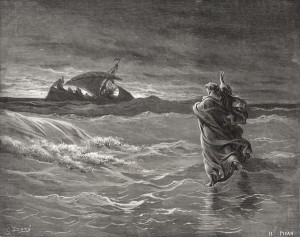From the Gospel of John:
When evening came, his disciples went down to the lake, got into a boat, and started across the lake to Capernaum. It was now dark, and Jesus had not yet come to them. The lake became rough because a strong wind was blowing. When they had rowed about three or four miles, they saw Jesus walking on the lake and coming near the boat, and they were terrified. But he said to them, “It is I; do not be afraid.” Then they wanted to take him into the boat, and immediately the boat reached the land towards which they were going.
(From the Daily Office Lectionary – John 6:16-21 (NRSV) – January 11, 2013.)
 Jesus walking on the water has always struck me as a very funny story. “Funny” in the sense of “oddly out of place”, although it also has a certain Monty-Python-esque quality to it as well. The fact that it is reported in three of the Gospels – in the synoptic Gospels of Mark and Matthew and here in John – attests to its importance for the early church. John’s version of the story is the simplest, but it contains all the elements – a storm, rough seas, disciples’ fear. Like Mark, John leaves out Matthew’s addition of Peter trying to join Jesus on the surface of the lake.
Jesus walking on the water has always struck me as a very funny story. “Funny” in the sense of “oddly out of place”, although it also has a certain Monty-Python-esque quality to it as well. The fact that it is reported in three of the Gospels – in the synoptic Gospels of Mark and Matthew and here in John – attests to its importance for the early church. John’s version of the story is the simplest, but it contains all the elements – a storm, rough seas, disciples’ fear. Like Mark, John leaves out Matthew’s addition of Peter trying to join Jesus on the surface of the lake.
I say the story seems out of place because it is (other than Jesus’ fit of pique at the poor fruitless fig tree, which has a parabolic quality to it, the fig being a rabbinic metaphor for the Torah; Mark 11:12-14, and Matthew 21:18-22) the single demonstration of divine power by Jesus which does not benefit another person or group of people. Other manifestations of power result in the provision of food (the wine at the wedding in Cana, the feeding of crowds of 5,000 and 4, 000) or in the healing of the supplicant or some other person. Jesus here seems to be simply about his own business. In fact, Mark makes it clear that “He intended to pass them by.” (Mark 6:48b) However, the disciples see him so he must respond.
It is Jesus’ response that underscores why this story is here, I think, and the NRSV translation does not do it justice. The Greek is “Ego eimi, me phobeithe.” The words “ego eimi” are the same words used in the Septuagint (the early Greek translation of the Hebrew Scriptures) when God’s identity is revealed as “I AM” (for this is what the Greek emphatically states). In Exodus, God speaks to Moses out of the burning bush and, when Moses asks God’s name, he is told, “I AM who I AM;” the Greek is “ego eimi”. (Exodus 3:14) In a similar way, Isaiah the prophet reports God saying several times, “I, even I AM He;” the Greek is “ego eimi.” Later in John’s Gospel, Jesus will use this same construction in his famous “I am” statements. Here as there, Jesus’ identity with God is what is stressed.
And this is also the import of the story of Jesus’ walking on the water, this miracle with no other purpose, no parabolic meaning as in the blasting of the fig tree, no benefit to another as in the feeding or healing miracles. This miracle simply demonstrates the power of Jesus over nature, and simply over nature, but over the forces of death and chaos represented by water and the storm. It is, purely and simply, a manifestation of divine power.
I try always to keep before my mind’s eye the Jesus who is human, to remember that he was “one who in every respect has been tested as we are” (Heb. 4:15) But every so often it is important to remember that Jesus is also divine, fully divine, God incarnate. It is necessary every so often simply to stand in awe of the One who walked on the water, the One WHO IS, and yet who humbled himself to become as we are.
====================
A request to my readers: I’m trying to build the readership of this blog and I’d very much appreciate your help in doing so. If you find something here that is of value, please share it with others. If you are on Facebook, “like” the posts on your page so others can see them. If you are following me on Twitter, please “retweet” the notices of these meditations. If you have a blog of your own, please include mine in your links (a favor I will gladly reciprocate). Many thanks!
====================
Father Funston is the rector of St. Paul’s Episcopal Church, Medina, Ohio.



Leave a Reply